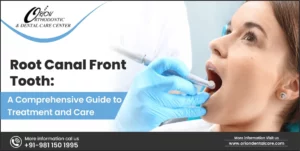Are you suffering from discomfort, sensitivity, or pain just after having a bite of ice cream or a sip of coffee? Are you also experiencing a dull or sharp pain in or around your tooth? There may be chances of a tooth cavity. Do not worry, oral cavities are becoming quite common, especially in children, teenagers, older adults, and even infants. It can be prevented by early detection and managed with timely dental treatments.
Our tooth is made up of three layers: the outer layer: enamel, the second layer: dentin, and the innermost layer which houses nerves and blood vessels in the pulp. Damage or decay of these layers of the tooth causes cavities. It can be reversed back by proper brushing and flossing if the cavity has just started and is limited to the enamel but after it reaches the dentine and pulp, it has to be treated and cannot be reversed. Scroll ahead to know more about tooth caries, their symptoms, causes, and most importantly how you can prevent them.
- What are Cavities?
- Signs and Symptoms of Cavities
- Reasons, you have cavities.
- What are the best treatment options for Cavities?
- FAQs
Also Read:- Full Jaw Dental Implant Surgery: Get immediate teeth within 24 hours
1. What are cavities?
Cavities, also called dental caries, are permanently damaged areas on the surface of your tooth. The decay begins with the destruction of the enamel by acids produced by bacteria causing its erosion and resulting in small pits and holes with blackening of the surface. As it progresses, the pits enlarge in size and the decay reaches the deeper layers, and you will start feeling discomfort or pain. Untreated dental cavities can lead to severe toothache, and infection and you may even lose your teeth.
2. Signs and Symptoms of Cavities.
The signs and symptoms of cavities depend upon the extent and it’s location and vary accordingly. When the cavity just begins to form, you usually don’t feel any pain or discomfort. As it progresses, some early signs and symptoms are:
- General tooth sensitivity: Mild sensitivity felt while eating/ drinking cold or hot.
- Discoloration: White and dark spots on the tooth surface will be seen.
- Holes and pits in the teeth: Small holes are formed due to erosion of the tooth surface. During a checkup, the dentist will feel a catch with the diagnostic probe.
- Bad breath: Due to plaque accumulations, full of bacteria, a foul smell from the mouth may be there.
- Food frequently trapped in or between the teeth: Due to pit formation, the food particles may be seen trapped in those areas on the tooth surface or in between two teeth.
- Occasional dull tooth pain: At times you may feel mild dull diffuse pain around the area of the developing tooth cavity.
When it is left unmanaged, the dental cavities may result in serious signs and symptoms:
- Toothache: This can spontaneously occur without any apparent cause or maybe constant.
- Sharp pain when eating or drinking, sweet, hot, or cold: Severe sharp pain may be felt with sweet, hot, and cold food and drinks.
- Pain while biting on food: There may be difficulty in eating food because of severe pain while applying pressure on the tooth.
- Severe pain, swelling of the face, and fever due to pus formation: At times due to infection, pus formation with severe throbbing pain with swelling in gums, or jaw, foul taste in the mouth, pain radiating to the ear, jaw, and neck and fever may occur. Untreated infection may cause loss of jaw bone and ultimately loss of the tooth.
Contact your dentist immediately if any of these symptoms occur.

Also Read:- What is the Best Solution for Pyria and Gum Diseases
3. Reasons, you have cavities.
The formation of dental cavities by tooth decay is a slow process occurring over some time. It develops due to:
- Plaque formation: Dental plaque is a sticky film coating your tooth surface, formed due to not brushing well and eating stickier and sweet foods. Bacteria feed and increase in number over residual food particles in your mouth resulting in plaque formation which, if still not removed hardens and forms calculus which is difficult to remove with brushing.
- Acid attack by a plaque: The bacteria in the plaque produce acids that remove minerals from your teeth and thus erode the surface resulting in the formation of tiny openings in the enamel. Slowly the bacteria make their way through the inner layers of dentine and pulp.
- Continuation of decay: As the bacteria reach the pulp and are still not treated, it causes irritation and swelling of the pulp tissue, resulting in severe pain. The damage may reach beyond the tooth root, to the bone causing serious infection.
You are at risk if:
- You do not brush and floss properly and regularly.
- Have frequent snacks and aerated drinks.
- Bedtime infant feeding and going to sleep without mouth cleaning.
- You have a dry mouth.
4. What are the best treatment options for Cavities?
Early detection and timely treatment are the keys to prevent serious issues and pain. The cavities treatment depends upon the extent and the stage of your tooth cavities:
- Professional fluoride treatments: if the cavity is at a very early stage, then this treatment can help it stop there and then. Regular brushing can help develop them again.
- Cavity Fillings: This is the most common cavity treatment method to restore your tooth structure to its original form and function by fillings of different materials like metal, tooth-colored composite, porcelain, etc.
- Crowns: When the decay is extensive, a crown may be needed to replace your complete natural tooth crown. The dentist will need to remove some tooth structures to prepare them to receive the crowns.
- Root Canal Treatment: When the cavity extends to the pulp, RCT is needed to remove the infected pulp and replace it with a filling.
- Tooth Extractions: Sometimes, teeth become so severely damaged that there remains no chance for them to be restored and they need to be removed.
The cavity treatment cost varies according to the treatment done. At Orion, all treatments are very reasonable.
Also Read:- Teeth Whitening Treatment Cost in India: How Long Does Teeth Whitening Last?
5. FAQs
1. How will I know if I have cavities?
Cavities look like brown-yellowish spots in the initial stages, usually, they are not seen in between the teeth and do not cause any symptoms until they extend to deeper tooth layers. Therefore, regular dental check-ups are the only solution to detect a cavity at its early stage.
2. How can I prevent developing cavities?
- Brush and floss twice a day.
- Avoid frequent snacking, and sugary and sticky foods.
- Eat healthy nutritious meals.
- Visit your dentist regularly.
- Drink water frequently.
3. Should we use fluoridated toothpaste for kids?
Fluorides prevent the development of cavities, but if ingested more than a certain amount may be harmful too. A pea-sized toothpaste is recommended but always take advice from your dentist before using them.
Takeaway
At Orion dental clinic, you will receive the best advice and solutions to all your dental issues with the highest success rates. With the most qualified and skilled doctors and staff using the latest techniques, equipment, and material, you will be assured to get the best results in a safe and comfortable environment.






